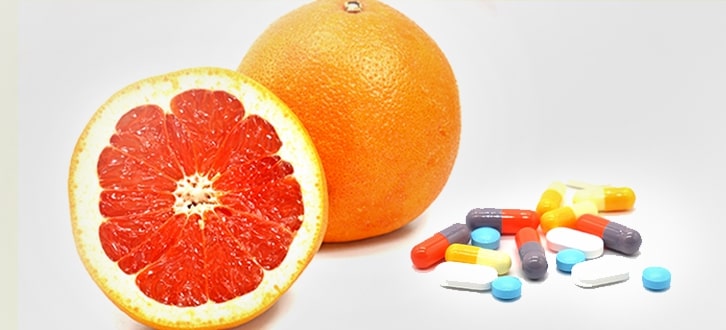How to avoid food and drug interactions
Author: CenterWell Pharmacy
Date Posted: Jun. 5, 2019

Medicines may be very specific in how they interact with your body and diet, and lifestyle factors may influence those effects. It’s important to know that what you eat may either assist in supporting the benefits of your medicine or it may have adverse side effects and could be dangerous. Having information about food and drug interactions can help you shape your diet to achieve your best health and avoid harm.
Below are 6 common food (or nonfood) and drug pairings that may cause negative side effects.
1. Tyramine and monoamine oxidase inhibitors
Monoamine oxidase (MAO) inhibitors, such as Marplan® or Eldepryl®, are used to treat depression. But they may react badly with foods that contain tyramine, found in aged and fermented foods. The combination can cause extremely high blood pressure, fever, and in rare circumstances, death. These foods include:¹
- Aged cheese
- Chianti wines
- Chicken liver
- Venison
- Sauerkraut
- Aged sausages like pepperoni and salami
2. Leafy greens and blood thinners
Taking blood-thinning medicine such as warfarin, Coumadin® or Jantoven®, in combination with large portions of foods high in vitamin K, such as leafy greens, may cause the medicine to be less effective. Eat these foods in moderation and talk to your doctor when taking this type of medicine.²
3. Alcohol and certain medicines
Avoid taking massive doses of Tylenol® (acetaminophen) and Tylenol-containing products with alcohol, as it may result in liver toxicity.³
Another medicine that may cause serious complications when taken with alcohol is metronidazole, prescribed to treat infections. Side effects of mixing alcohol and metronidazole may include flushing, vomiting and increased heart rate.⁴
4. Grapefruit juice with common medicines
Grapefruit is a nutrient-rich, healthy food choice, but it may be a food you need to steer clear of when taking certain medicines. Grapefruit juice can cause the drug to be absorbed differently in your body, causing too little or too much of the medicine to enter your bloodstream. More than 50 medicines are affected by grapefruit juice, including those that treat depression, arrhythmia, seizures, high blood pressure and high cholesterol. Here is a partial list:⁵
- Lipitor®
- Zocor®
- Plendil®
- Valium®
- Tegretol®
- Pacerone®
- Prograf®
5. Calcium with some osteoporosis medicines and antibiotics
Calcium-fortified foods and drinks, such as milk, orange juice and cereals, may decrease the effectiveness of some osteoporosis medicines and antibiotics. The calcium can change how your body absorbs the medicine and its ability to help treat your body. To avoid this interaction, calcium supplements and calcium-fortified foods should be taken at least 1 hour after the medicine.⁶
6. Avoid taking aspirin on an empty stomach
While aspirin can help reduce pain from inflammation, it also can cause damage to the lining of your stomach. It may be beneficial to take aspirin with food and a full glass of water. Talk with your provider if you feel stomach pain or have a history of ulcers.⁷
This material is provided for informational use only and should not be construed as medical advice or used in place of consulting a licensed medical professional. You should consult with your doctor to determine what is right for you.
Sources:
- “MAOIs and Diet: Is It Necessary to Restrict Tyramine?” Mayo Clinic, last accessed May 6, 2019, https://www.mayoclinic.org/diseases-conditions/depression/expert-answers/maois/faq-20058035.
- “Patient’s Guide to Taking Warfarin,” American Heart Association, last accessed May 10, 2019, https://www.heart.org/en/health-topics/arrhythmia/prevention--treatment-of-arrhythmia/a-patients-guide-to-taking-warfarin.
- “Actea (Acetaminophen) and Alcohol/Food Interactions,” Drugs.com, last accessed May 6, 2019, https://www.drugs.com/food-interactions/acetaminophen,aceta.html.
- “Metronidazole and Alcohol/Food Interactions,” Drugs.com, last accessed May 6, 2019, https://www.drugs.com/food-interactions/metronidazole.html.
- “Grapefruit Juice and Some Drugs Don’t Mix,” U.S. Food and Drug Administration, last accessed May 6, 2019, https://www.fda.gov/consumers/consumer-updates/grapefruit-juice-and-some-drugs-dont-mix.
- “Calcium,” WebMD, last accessed May 8, 2019, https://www.webmd.com/vitamins/ai/ingredientmono-781/calcium.
- “Answers about Aspirin, “Harvard Health Publishing, last accessed May 6, 2019, https://www.health.harvard.edu/heart-health/answers-about-aspirin.